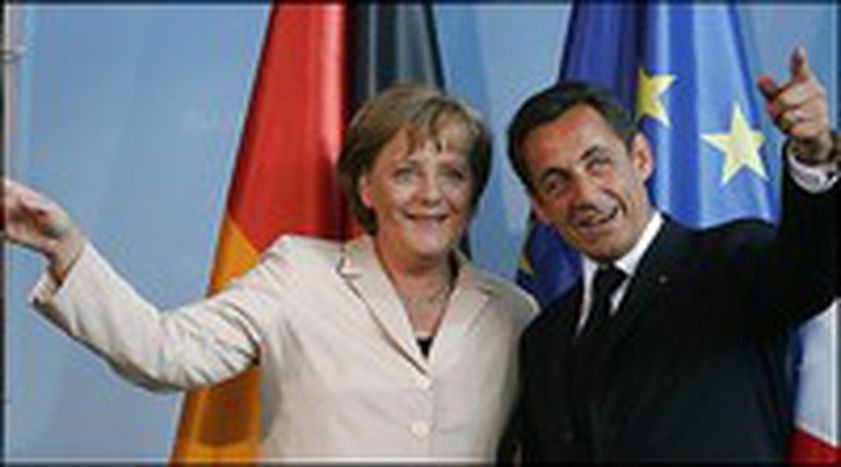
Merkozy is leaking water
Published on
Translation by:
Rebecca CaulfieldA conflict of interest is poisoning the apparent honeymoon between the French and German leaders, Angela Merkel and Nicolas Sarkozy, as they work on the EU constitution
Before Nicolas Sarkozy’s election to the French presidency on 6 May 2007, German Chancellor Angela Merkel made a prediction to French daily Le Monde, for a conservative candidate and members of the same political family that she 'knew well'. As everyone knows, families have their problems. Few analysts are capable of appreciating the famous 'French-German motor' of the European Union. 'Merkozy' is nothing more than political fiction.
Understanding diplomacy: pure theory
'Merkel’s post is easier at an international level,' claims German public television channel Deutsche Welle, especially with Sarkozy as the newest right-wing French president. The German media consider that Sarkozy, who is closely aligned with Washington and wants to remain distant from Turkey’s aspirations to join the EU, will help unite France and Germany in their diplomatic causes.
It later became evident that Sarkozy and Merkel cannot agree fully even on this area. The German Chancellor, leader of a coalition government made up of christian democrats and social democrats, has become more closely aligned with the USA, but not to the same extent or with as much passion as Sarkozy has demonstrated. It is thought that Germany perhaps feels pressured by the responsibility of having just ended their time as EU presidents, and so has to maintain a softer position on Turkey than France.
Show me the greens
The most visible clash between Sarkozy and Merkel has been the question of money. The French decision to postpone reducing the public deficit to the levels laid down by Brussels by several years has annoyed the German government. Peer Steinsbrück, economics minister and social democrat, told Sarkozy in a July EU reunion that the biggest countries 'have to lead by example,' according to reports in the Spanish newspaper El País among others. It appears though that the French leader did not appreciate such frankness. 'That is not how one speaks to a President!' he blurted out to Steinsbrück, informing him that his observation could bring consequences.
Even within the economics field, there have been two areas in which France and Germany have clashed. First, Sarkozy insisted that the European Central Bank should not increase interest rates - a decision which could further hurt the flailing French economy. Berlin consider this move interventionist and advise against it. The second cause of friction is the European Aeronautic Defence Space Company (EADS). The president and chancellor have had their ups and downs in negotiating the distribution of power in Airbus, the European Aviation Building industry and they have been debating on their own commercial and political interests.
Two opposing styles
It appears as though Merkel is the protagonist in this tale. Sarkozy also appears to be a main character, especially in international forums, but despite their charisma and love of the cameras, neither of them is capable of ignoring the cracks that are forming. An example of this was seen on 10 September during a meeting with the two leaders in the Mesenburg Palace near Berlin. As on other occasions, Sarkozy did not hesitate in getting close to Merkel and kissing her, something which is not considered normal in formal German situations. It is not that the chancellor shies away from her colleague but this cultural difference, or perhaps even political, demonstrates that she is not as comfortable as the French leader in these situations. Perhaps she preferred the attentive kisses she used to receive from Chirac. In any case, the Merkel-Sarkozy meetings are a delight for psychologists interested in interpreting human expression.
Indelible chinks in the story
At times it can seem as though Sarkozy is a refreshing and indeed necessary change in politics; however, the following is an example of something he got very wrong. At a February 2007 rally in the southern city of Nice, Sarkozy said France 'has not carried out a genocide' with reference to the Holocaust. It is understood that this phrase was not interpreted as a friendly gesture from either side of the border. Elisabeth Guigou, former French Socialist minister, accused Sarkozy of 'neglecting the French-German reconciliation that both heads of state had made during the middle ages.'
Germany has not eliminated all the old feelings of suspicion and resentment either. There was an incident involving ex-chancellor Konrad Adenauer, made public by the media, who once said 'in order to speak to France, you must first salute the French flag at least three times.'
In-text photo: Fed up with Sarkozy? (Débats-Sarkozy.fr/ Flickr)
Translated from Merkozy hace aguas



